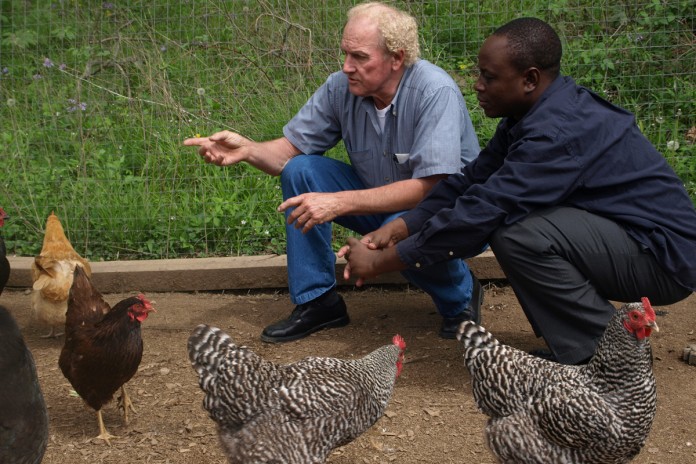SHERRODSVILLE, Ohio — If you give a man an egg, he eats. If you give him an incubator and a hatchery, he hatches eggs. Those chicks grow, and with them the possibility of elevating an entire society out of poverty.
That’s the idea two men, from different parts of the world, have to bring hope to Africa’s impoverished.
The American
Glenn Norris, a retired business owner from Sherrodsville, Ohio, has dedicated the last several years of his life to mission work, but he’s not simply sending money from the comfort of his home, he’s been traveling to Africa.
After meeting a Kenyan missionary who was speaking at churches in eastern Ohio, Norris had a calling. “God put a burden on my heart to go to Kenya, Africa and see how I might be able to help the people.”
Norris traveled alone to Kenya in 2001. His plan was to meet with the Kenyan missionary and begin helping.
The Kenyan
Rev. Boniface Abanga grew up in a village several miles from the market town of Migori, Kenya.
Migori is roughly 250 miles, or an eight-hour drive, from Nairobi, Kenya’s capital.
When he was in 11th grade, he was forced to quit school because his father, who was a retired security guard, couldn’t afford to pay Abanga’s tuition. When he left school, Abanga was near the top of his class.
According to Abanga, it’s a common story in Kenya. Many children who live in poverty are unable to finish high school.
Boys are often forced to quit school to work low-paying jobs, teenage girls often drop out after they begin menstruating. (Personal hygiene products are expensive, and many poor families don’t have the resources to buy them, so girls stay home from school for one week every month. Because of the absences, girls fall behind in their classes, and usually end up leaving school.)
Determined to finish school, Abanga worked as a brick layer, and saved his money to re-enroll and graduate. Two years later, Abanga walked into his classroom, again.
Though he graduated, he was no longer near the top of his class.
“Because I was working, I couldn’t concentrate only on school. I received average marks on my exam.”
After working for a local school for four years, in 1999, Abanga enrolled in the Hands Of Mission Seminary and received a bachelor’s degree in theology.
Story Continues Below Photos (click on photo to read identification)
The place
Surrounded by smaller, mostly mud hut villages, Migori is a central hub for many of those living in the area.
Migori has electricity, schools and various businesses. It also serves at the Migori District’s capital, making it an ideal spot to start a business.
In Kenya and much of rural Africa, residents of the villages make long walks, sometimes as many as 20 miles a day, to and from the market towns in order to make enough money to eat, for a day.
It’s that daily routine that defines the lives of Kenya’s poorest citizens. It’s something that Abanga wants to change.
“If we change people in the society, teach them how to do something, we transform their thinking.”
But, according to Abanga, donating money doesn’t facilitate change.
“When somebody gives you money, when that money stops, you’re left where you started.”
It’s this philosophy that brought Norris and Abanga together in 2008.
The solution
Norris and Abanga met during one of Norris’ trips to Kenya.
Abanga posed a question, “How can we come up with a self-supporting program? If we identify somebody with a need, we can help them to know how to raise their own resources so that their kids can get involved and learn to develop a work ethic.”
Norris agreed. “I didn’t want to start a welfare program. It’s not fair what we do to those people. We take them out of poverty and then, if the program stops, they have nothing, again.”
“To me, that’s worse than if we didn’t do anything in the first place.”
In 2008, with support from local churches in Ohio, the men rented a building and established The Church of The Living Hope in Migori.
“Through the church, we hoped our potential would become contagious and impact the society,” said Abanga.
Norris, however, wasn’t satisfied with only a church, he wanted the project to expand and become self-sustaining. He didn’t want to rely on donations from churches back home.
Chicks
In 2010, Norris helped construct the first chicken house and it was populated with 400 chicks. In Migori, the program is known as “Hope Chicks.”
“We picked chickens because there’s a market for it,” Norris said. “There’s a market for every egg you can get hold of and every chick you can raise.”
Abanga said having a good work ethic is important to finding jobs in Africa. A main pillar of the program is to help provide training and a good work ethic to those involved. “We want a self-sustaining program that trains, educates and involves. Our people work hard, but the lack knowledge.”
Moving forward
The program now has two, 500-egg incubators and provides enough income to support the church or Abanga’s family, but not both.
Unfortunately, the project’s support from local churches has dried up and in order to become self-sustaining, the project must be expanded.
“We can almost reach out and touch the 100 percent self-supporting spot,” said Norris.
Norris and Abanga plan on expanding the operation by building a hatchery and eventually providing four families with the tools needed to raise their own chicks, thus lifting those households from poverty.
Other entrepreneurial ideas include buying motorbikes, a common form of transportation in Kenya, and employing men to taxi residents.
“Our main intention is to spread the word of God and to lift the standard of living of every person in the society.” Abanga said, “If they can make a little money to educate their children, then they will become better people.”
Norris said if you’re interested in helping “Hope Chicks,” you can make a cash donation or even donate your old farm equipment. He’ll take any old farm equipment and refurbish it to sell. Profits will go to helping the mission in Africa. If the equipment is in too bad of shape to repair, he’ll scrap it.
Contact Glenn Norris for more information and questions: gcnorrisusa@hotmail.com, 330-691-0440.











Pastor Boniface came to our Church, Cuyahoga Chapel Church of God twice, he stayed with my parents both times, so my children and I were able to spend more time with him! We really felt blessed by his presence, and if God could find a way for it to be possible, we would’ve jumped on the jet with Pastor Boniface this evening @ 7:53 and gone with him to Kenya! God willing, one day it will happen! Thank You Lord for bringing Pastor Boniface into our lives, and bless him and his family, and his works in his village!
Hi am Nicky living in Maryland and am from Kenya, ilove visitors very much so when you get time visit me in kenya am planning to relocate come next yr. Thanx
this is pastor boniface,am here in Ohio usa,i wanted us to meet again for some followup